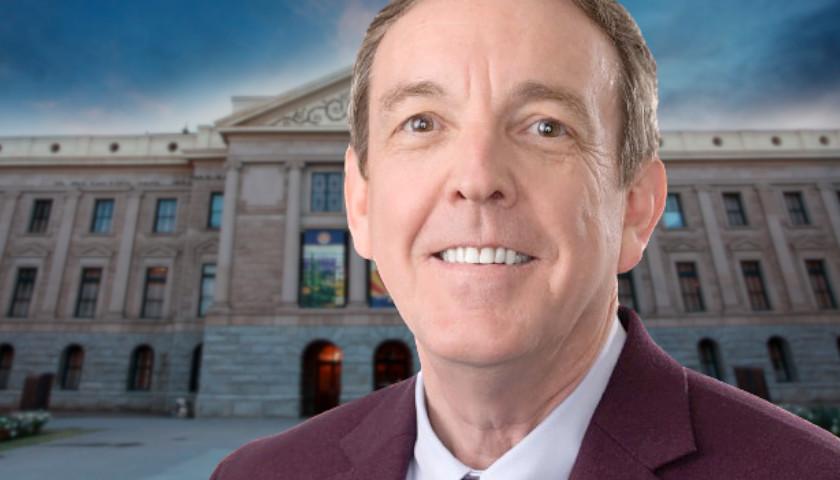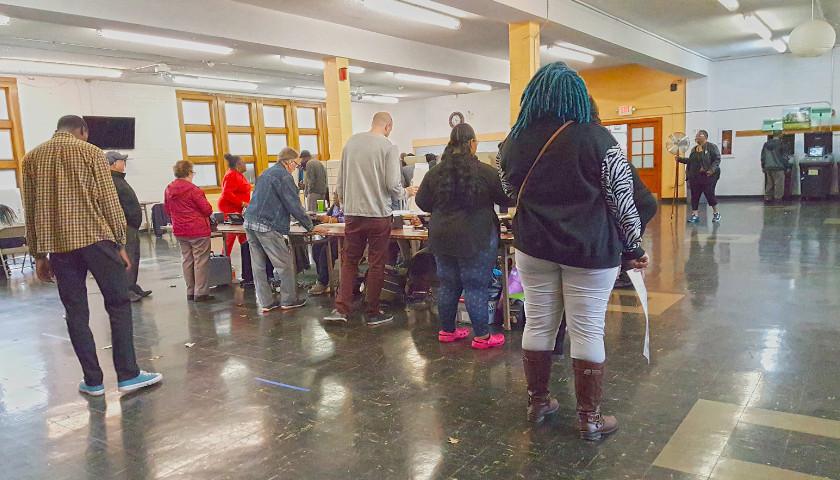The Arizona Legislature is considering sending an election integrity measure to the ballot this fall.
HCR 2056 was debated in the Senate Elections Committee last week. The bill would require voters to show photo ID when dropping ballots off. All early ballots dropped off will be tabulated at the voting location where they were submitted. Seven counties already do that. The bill also prohibits election officials from accepting funds from foreign entities to help administer an election.
The committee voted 4-3 along party lines to send it to the Senate floor for a full vote, but State Senator Ken Bennett (R-Prescott) expressed considerable skepticism during the hearing, raising concerns that he might vote with the Democrats to defeat it.
Bennett (pictured above) testified during the hearing that he had concerns about the bill’s language. “This is a work in progress,” he said. He said he wanted to ensure that the bill did not eliminate the newer massive vote centers. Election integrity proponents have been highly critical of some counties’ shift to large vote centers, citing concerns that it creates more opportunities for fraud.
State Senator Wendy Rogers (R-Flagstaff), who chairs the committee, said the bill was proposed in response to long lines in 2022 and voter disenfranchisement.
She said, “We’ve somehow agreed to sacrifice accuracy over timeliness. … What we want is accuracy. What we want is the sacredness of 250 years of blood and treasure spilled for our vote. We want that saved. We have become a society that has elevated convenience and elevated comfort at the expense of faith and trust in the vote. It is our voters who have come to us across all 15 counties who have had said that they worry for the sanctity of our vote.”
HCR 2056 already passed the Arizona House of Representatives, but Republicans have only a one-vote majority in the State Senate. Ballot referrals from the legislature bypass the governor and go directly to the ballot after being passed.
The bill ends the practice of dropping off ballots at the polls on Election Day before 7 p.m. Beginning in 2026, the latest voters could drop them off would be 7 p.m. on the Friday before the election. In 2022, Maricopa County Recorder Stephen Richer said the last-minute influx of early ballots caused the delay in counting the ballots for days after the election. He has advocated for the end of the practice as well.
Also during the hearing, Democratic Secretary of State Adrian Fontes testified about the extra cost and how far people would have to drive to vote. He claimed that the $11 million allotted to the counties by the bill for the additional costs was not enough.
Rogers pointed out that there is an entire month of early voting, so people who don’t want to drive extra could vote by mail instead. She said the legislature had requested a cost estimate but hadn’t issued one yet.
Fontes responded and brought up scenarios where a voter ran out of time to vote before the Friday before the election, but didn’t have time to drive to a voting location since it wasn’t nearby.
Rogers said, “We have 27 days to vote.”
Fontes said he didn’t see a problem with how elections are conducted so didn’t think anything needed fixing. He said he didn’t like adding more restrictions for voters. Rogers responded, “I would just add my final note that it actually adds choices.”
Rogers explained that the changes would speed up the process of counting ballots, resulting in “timely reporting” instead of taking weeks.
State Senator Brian Fernandez (D-Yuma) complained about people who have to drive to pick up their mail, stating that could delay the process of voting.
“It’s just a few people that are on the extreme that want to figure out a way to make it more difficult for people to do what they should be able to do,” he said.
Several county recorders or their representatives who testified about increasing staffing, finding polling locations large enough for an extra tabulator, and the cost of the tabulators.
Bennett talked about the extra work tabulating ballots at the voting locations during every day of early voting. Rogers responded, “Florida manages to do this.”
Fernandez said Florida has faster results “because it’s no longer a swing state.” Rogers said she disagreed with that, and pointed out that it is a “more populous state.”
Rogers addressed the negativity from some of those testifying. “Sometimes when we say can’t, it really means we won’t,” she said.
State Senator John Kavanagh (R-Fountain Hills) responded to claims that the bill will increase lines due to requiring photo ID for those dropping off their ballots. He said it would do the opposite, since those voting on Election Day will no longer have to compete with voters dropping off early ballots.
Democratic Pima County Recorder Gabriella Cázares-Kelly testified that the bill would “disenfranchise voters.”
Rogers responded, “We’re doing this because the voters are asking for it.”
Merissa Hamilton of EZAZ testified that she disagreed with Fontes’ assertion that the elections are fine.
She said, “A public survey conducted by Maricopa County and the Recorder’s office for 2022 found that one-third of early voters rated their experience as bad, and almost 60 percent of Election Day voters also rated their experience as bad. … So the assertion that ‘the voters are just totally pleased, there’s nothing broken, we don’t need to fix anything’ is patently false.” She said it was a “talking point that they invented.”
Hamilton suggested defunding the “censorship operation” conducted by Richer in order to acquire more funds. She said those funds are being used under the guise of “election security.” She explained how The Gavel Project requested thousands of records from Maricopa County which revealed this project. Hamilton said there are 11 to 12 people who track posts on X, watch Rumble and YouTube videos, then “make those videos disappear.”
State Senator Sonny Borrelli (R-Lake Havasu) observed that Clean Elections, which is funding the $11 million, receives $200 million, so extra funds might be taken from that.
A date has not yet been set for the full Senate vote.
– – –
Rachel Alexander is a reporter at The Arizona Sun Times and The Star News Network. Follow Rachel on Twitter / X. Email tips to [email protected].
Background Photo “Arizona Legislature” by Gage Skidmore. CC BY 2.0.





